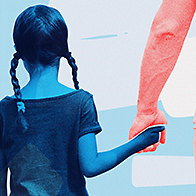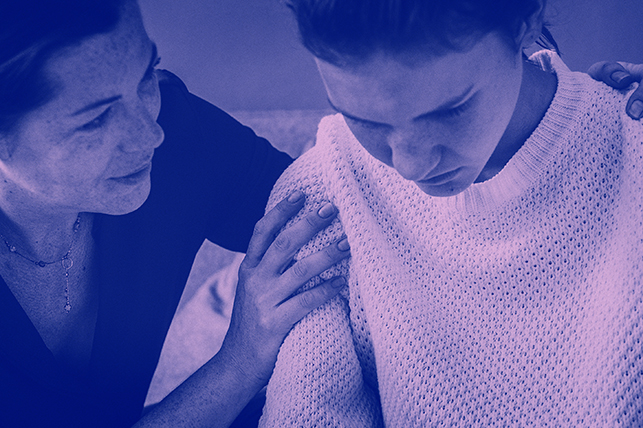For Boys to Men, Sexual Assault and Rape Are Very Real Issues

About 25 percent of men in the United States have experienced some form of sexual violence or rape in their lifetime, according to statistics published in 2015 by the Centers for Disease Control and Prevention's National Center for Injury Prevention and Control.
And if that number wasn't shocking enough, consider the fact that most likely it's a conservative estimate because the data is taken from participants who were willing to disclose their experiences. There may be many others who live in a world where some sexual advances toward men are normalized, or they are simply too embarrassed, ashamed or afraid to speak about their experiences.
Despite stigma perhaps dampening down the numbers, the unfortunate reality is that boys and men are victims of sexual assault and rape in the U.S.
The symptoms of male rape
Sexual abuse and assault can happen to anyone, but men who have been assaulted or abused may face different consequences.
"All survivors of sexual assault are likely to experience some psychological consequences," explained Sarah Bishop, B.Sc., a clinical psychologist based in the United Kingdom. "For men who have been sexually assaulted, stereotypes about 'masculinity' can impact greatly on recovery. The belief that they should have been strong enough to fight off the perpetrator can lead to feelings of shame, which in turn can lead to depression and anxiety."
Victims may suffer in silence and become fearful of what could happen if they were to speak up.
"For boys who have been assaulted, fears about what might happen if they disclose [it] or even a lack of knowledge that what is happening is wrong become 'normalized,' as boys will often suffer in silence," Bishop said. "This, sadly, can lead to feelings of self-blame and shame, which can impact significantly on their mental health."
She added that during an assault, the body can generate physiological reflex responses such as an erection, which may also lead to feelings of shame and confusion. It is important for boys and men to remember that physiological arousal does not demonstrate consent or psychological enjoyment.
For men who have been sexually assaulted, stereotypes about 'masculinity' can impact greatly on recovery.
Male victims can often experience an identity crisis or have feelings of shame and "contamination," which may lead to different problems down the line.
"For many men who experienced sexual assault or abuse, it often leads to an identity crisis," said Danny Greeves, B.Sc. (Hons), a trauma expert in the U.K. "The experience can overwhelm and destroy who they thought they were, which can lead to them getting stuck in a downward spiral that can be hard to break out of alone. Post-traumatic stress disorder is a condition developed by many men following assault, although they may never receive an official diagnosis.
"Alongside this, many survivors of sexual assault and abuse withdraw from their normal behaviors of daily living," he added. "Shame is a powerful driver of this withdrawal, but the knock-on effects are [that] men then spend long periods inside their own head with only those strong negative thoughts and feelings as company. This can quickly lead to depression and other common mental health conditions."
Greeves also noted that a common denominator in many men following sexual assault is a feeling of contamination, that in some way they have been tainted as a person. This deep sense of contamination leads to a feeling of being "less than" and also contributes to low self-esteem. The feeling of not "being enough" then drives many unhelpful or unproductive behaviors, which can hinder their social and romantic relationships going forward.
Why don't males report cases of rape?
Even if society is becoming more progressive and open to different gender identities, the masculine stereotype of a macho man who's stoic, mentally resilient and in control of his thoughts and emotions still persists for some people. There are influencers and social media accounts where you can see the proliferation of "alpha males," who encourage boys and men to ignore and mask their feelings since they're only a distraction and a sign of weakness.
"One of the primary issues preventing male victims from seeking help is the level of shame they experience as a result of the assault or abuse," Greeves explained. "Despite society making excellent progress in recent years on updating the old stereotypical view of the male role, this conditioning still runs deep for the majority of men. The notion of being a man still involves him being strong and self-sufficient in many males' eyes. Being the victim of a sexual assault violates that image of what a man 'should' be, and so the feeling of shame can be overwhelming. As a result, many men suffer in silence.
"Another prominent issue stemming from the shame of being a victim of sexual assault is that many men have the perception that seeking help will involve sharing all the details and the stories of the event in therapy," he added. "They fear having to 'relive' the experience, where all they really want to do is block it out. The idea of being vulnerable and opening up about all these issues then becomes terrifying for many male victims and so they choose to self-medicate instead. Often this involves alcohol, drugs, gambling or other compensatory behaviors."
If a male buys into the "masculine identity," they develop the habit of ignoring and suppressing negative emotions. For a person who's not used to understanding and sharing their sources of anxiety and insecurity, something terribly scarring—such as sexual assault—can evoke significant feelings of discomfort, shame and humiliation they don't wish to acknowledge, let alone share with others.
Obstacles for males include not only the feelings that are repressed and buried deep in their subconsciousness and never even acknowledged but also the inability to discuss the experience with other people.
Many males are led to believe they ought to maintain their social status in front of others by being stoic and tough, without showing any sign of "weakness." A male who has been raped or sexually assaulted may falsely view the event as one where they were dominated by another person, evoking feelings of shame and guilt for not resisting the advances, even if that wasn't really an option for them.
"Shame and misinformation have a big part to play in this. Sadly and inaccurately, stereotypes that men should be aggressive and that they are not meant to feel vulnerable about sex make speaking out about unwanted sexual experiences very difficult for men," Bishop explained. "Many survivors on some level subscribe to these myths about masculinity and, thus, the shame they experience when they have not lived up to the stereotype can feel overwhelming. Frustratingly, perpetrators of abuse rely on these myths to enable their offending and to silence survivors.
"It's important to challenge the notion that men shouldn't talk about their feelings and instead understand that to do so is a sign of strength rather than weakness," she added.
After sexual assault, what can you do?
For men who have experienced a sexual attack, it's important to recognize that it happens to a lot of men. Roughly 1 in 6 males have experienced some form of sexual abuse or assault during their lifetime, and awareness of these issues is growing.
It's essential to understand that experiencing sexual abuse does not make you any less of a man. You are not weak, incompetent and inadequate because of that experience. Being vulnerable is OK, but sharing with others is a sign of strength and bravery. It's a major challenge that you've chosen to overcome.
Although opening up to your family, friends and your current partner is an excellent first step as it can provide you with a lot of emotional support to keep going, any victim of sexual abuse should seek professional help because there is undoubtedly a tremendous amount of emotional and physical trauma that needs to be properly processed.
"We must support male victims of sexual abuse by letting them know it's OK to talk about it, that it's not their fault, and educating them on the various resources available to them, including counseling and legal recourse," said Barry Salzman, a lawyer and partner at the Barasch & McGarry law firm in New York City. "Empowering them to learn to live without shame or judgment is also very helpful. Men, like women, should feel they are able to report these incidents and receive the proper support from the law enforcement and medical communities."
Regarding legal protections, he noted that a male rape victim is entitled to the same legal protections and redress as any female victim. Men can, and should, avail themselves of the legal system with equal opportunity, and law enforcement agencies should have the same resolve to prosecute perpetrators of male and female sexual assault alike.
Creating a safe environment
"As a society, we still have a long way to go in our efforts to eradicate sexual abuse," Salzman said. "However, throughout my years of pro bono representation of sexual abuse survivors, I've seen a significant positive shift toward better understanding the harm caused by this abuse, more fully supporting the survivors and holding the perpetrators accountable. This positive momentum is encouraging and must continue."
It is also imperative to underline the fact that sexual abuse can happen to anyone, regardless of sex, gender, race, ethnicity or location.
"I would highlight further that sexual abuse against boys of color has largely been excluded from public discourse," said Jennifer M. Gómez, a trauma researcher and assistant professor at the Boston University School of Social Work, and a scholar dedicated to understanding the effects of physical, sexual and emotional trauma in diverse and marginalized populations. "When sexual abuse against boys is discussed, it tends to focus on white boys who were sexually abused by men. Moreover, because of the adultification and stereotyped hypersexuality of boys of color, female-perpetrated sexual abuse against boys of color is additionally rarely characterized as abusive.
"This exclusion makes sexual violence and harassment understood as something that only happens to girls and women," Gómez added. "So when boys and men experience sexual violence and/or harassment, it is that much more difficult to name it as such, much less to find education and resources about it."




















